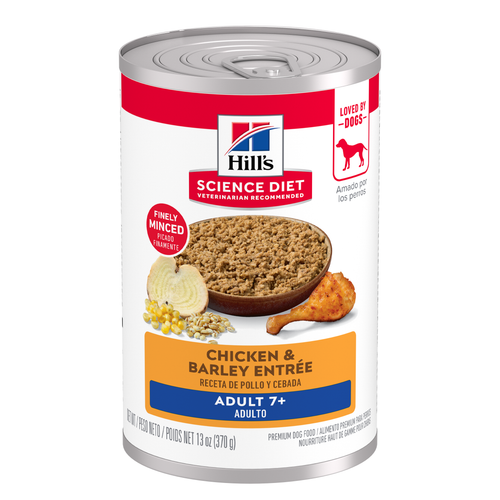
-
Find the right food for your petTake this quiz to see which food may be the best for your furry friend.Find the right food for your petTake this quiz to see which food may be the best for your furry friend.Featured products
 Adult 7+ Chicken & Barley Entrée Dog Food
Adult 7+ Chicken & Barley Entrée Dog FoodChicken & Barley Entrée in a delicious loaf with precisely balanced nutrition to support mobility and muscle mass for older dogs
Shop Now Adult Chicken & Barley Recipe Dog Food
Adult Chicken & Barley Recipe Dog FoodSupports lean muscle and beautiful coat for adult dogs
Shop Now Adult Large Breed Chicken & Barley Recipe Dog Food
Adult Large Breed Chicken & Barley Recipe Dog FoodSupports healthy joints, lean muscle, and beautiful coat for large breed dogs
Shop NowFeatured products Senior Vitality Adult 7+ Tuna & Vegetables Stew
Senior Vitality Adult 7+ Tuna & Vegetables StewImproves Everyday Ability to Get Up & Go
Shop Now Adult Turkey & Liver Entrée Cat Food
Adult Turkey & Liver Entrée Cat FoodPrecisely balanced nutrition with the delicious taste of minced turkey & liver to help fuel the energy needs of cats during the prime of their life
Shop Now Adult 7+ Indoor Chicken Recipe Cat Food
Adult 7+ Indoor Chicken Recipe Cat FoodSupports energy level and beautiful fur in mature indoor cats
Shop Now -
Dog
- Dog Tips & Articles
-
Health Category
- Weight
- Food & Environmental Sensitivities
- Urinary
- Digestive
- Joint
- Kidney
-
Life Stage
- Puppy Nutrition
- Adult Nutrition
- Senior Nutrition
Cat- Cat Tips & Articles
-
Health Category
- Weight
- Skin & Food Sensitivities
- Urinary
- Digestive
- Kidney
-
Life Stage
- Kitten Nutrition
- Adult Nutrition
Featured articles How to Properly Mix Wet & Dry Pet Foods
How to Properly Mix Wet & Dry Pet FoodsAn Orange cat eating from a bowl filled with mixed food
Read More What Is Littermate Syndrome? Pet Adoption Guide
What Is Littermate Syndrome? Pet Adoption GuideLearn more about littermate syndrome in dogs and cats and how to successfully navigate adoption and early socialization processes.
Read More The Science Behind Our Love for Pets
The Science Behind Our Love for PetsLearn the scientific reasons why we have such strong connections with our pets, and what science says about the love between humans and our furry friends.
Read More -


Have you always wanted to know how to become a vet? Or maybe how to become a pet nutritionist? You've come to the right place.
Veterinarians are a different breed of doctor. Besides the tough competition, trying odds and staggering workload common to all medical professions, veterinarians also face being scratched, bitten and sprayed with anal gland fluid. It's clear vets have to really love what they do.
As for becoming a pet nutritionist, it takes dedication and grit to gain the food science knowledge required to develop better meal plans for animals and make individualized recommendations for pets. Someone studying companion animal nutrition has to have a true passion for helping pets live longer, healthier lives.
Read on to catch a glimpse into how vets become vets and how pet nutritionists get to where they are. Along the way, you'll be treated to tips and tricks of the trade.

How to Become a Vet 101
The first thing veterinarians always tell aspiring veterinarians is: "You can do it!" Ignore all the naysayers who say, "But it's so hard!" What you need when you're first starting is encouragement. After all, animals need more people like you.
Here's a brief run-down of what's required:
- A strong interest in (that is, love of) animals
- Lots of determination
- A positive, steadfast and motivated nature
- Four years in veterinary school
- Passing a national vet exam and state license exam
The International Council for Veterinary Assessment offers the North American Veterinary Licensing Examination twice a year for all vet candidates in the U.S. and Canada. Just like the bar exam for lawyers or the physical test to become a firefighter, it ensures that everyone who wants to enter the profession is educated and ethically prepared.
Education Requirements
There is no age at which anyone is considered too old to become a vet. A four-year undergraduate degree from an accredited institution is generally required to enter veterinary school, but no particular major is absolutely required. Most prospective vets tend to major in the biological sciences, but art history and philosophy are not unheard-of.
Prerequisites for entry into veterinary schools may vary. Depending on the school, one of several standardized examinations may be required as a prerequisite. If you're thinking about getting a Doctor of Veterinary Medicine (DVM) or a Veterinariae Medicinae Doctoris (VMD), the two main veterinary degrees, you should select a few favorite schools and read their online admissions pages. Applications are due nearly a year in advance in most cases, so start preparing early.
Veterinary school is a 24/7 endeavor. Outside jobs on top of classes and clinical work are discouraged, so you may have to plan your finances carefully. Student loans are readily available but it always makes sense to read the financial aid pages for each veterinary program you're considering applying to.
Vet Specialties
Veterinarians may specialize in companion animals, large animal and agricultural species or exotic animals. After successful graduation and examination, an individual license must be obtained in the state you intend to practice. If a vet elects to enter public service (working for the government) or industry (such as a pharmaceutical company), state licensing is not usually required. Vets can work in any number of areas: zoos, research institutions, the federal government, pet product manufacturers or pet food companies, for example.
The most commonly elected field is general private practice. This includes your typical hometown veterinary clinic position and large-scale corporate practice. Future general practitioners should know that their work will consist of lots of hands-on care performing physical examinations and plenty of work one-on-one with the public, so people skills can be just as important as animal know-how.
Practicing veterinarians may elect to specialize even further. Some may obtain PhDs and enter research and academia. Want to be a feline ophthalmologist? Others may elect to complete a residency in surgery, internal medicine, cardiology or dermatology, among other possibilities, writes the American Veterinary Medical Association. Specialists tend to work in private veterinary practices or in specialty hospitals.



Tasty Tips
Young pets may need several visits in their first year for vaccinations. Adult pets generally benefit from annual check-ups, while senior or special-needs pets might require more frequent visits.
How to Become a Pet Nutritionist
Like veterinarians, pet nutritionists are scientists first. A strong curiosity for animals and biology is crucial. An interest in or talent for statistics and computers is strongly recommended, as the nutritional sciences are often data-intensive. Pet nutritionists conduct and analyze important research for animals' health and longevity.
Pet nutritionists generally require a four-year undergraduate degree in animal sciences, biological science or agricultural science. Financial aid is often available for those who study animal nutrition.
Pet nutritionists may receive further training on the job. Many go on to obtain master's degrees or PhDs in this field. The American College of Veterinary Nutrition maintains a helpful lineup of conferences and programs for vet students interested in how to become a pet nutritionist.
Avenues for work as a nutritionist include:
- Academic research to identify better ways to feed pets
- Research and development for pet food companies devising healthy pet foods (You, too, could be chasing around 450 cats and 450 dogs in the Hill's Global Pet Nutrition Center.)
- Working for the government helping regulate pet food quality and safety, like the Association of American Feed Control Officials
- Working with the public helping pet owners select better food for their pets
Now you know how to become a vet (and how to become a pet nutritionist), but the action is up to you. Remember, you can be anything you work hard for. So what are you waiting for? Go get that degree, and start helping pets and their humans.


Dr. Patty Khuly is an award-winning veterinarian known for her independent thinking, her spirited pet advocacy, her passion for the veterinary profession, and her famously irreverent pet health writing.
Dr. K is an honors graduate of both Wellesley College and the University of Pennsylvania School of Veterinary Medicine. She received her MBA at The Wharton School of Business as part of the prestigious VMD/MBA dual-degree program. She now owns Sunset Animal Clinic, a veterinary practice in Miami, Florida.
Related products

Supports lean muscle and beautiful coat for adult dogs

Chicken & Beef Entrée in a delicious loaf with complete & balanced nutrition to help keep adult dogs active and healthy

Chicken & Barley Entrée in a delicious loaf with great taste and precisely balanced nutrition to support 5 essential building blocks for lifelong health

Supports healthy joints, lean muscle, and beautiful coat for large breed dogs
Related articles

Learn more about littermate syndrome in dogs and cats and how to successfully navigate adoption and early socialization processes.

Understanding how to train puppies and kittens starts with understanding their differences. Discover tips for training success for puppies vs. kittens.

An Orange cat eating from a bowl filled with mixed food

Learn the scientific reasons why we have such strong connections with our pets, and what science says about the love between humans and our furry friends.

Put your pet on a diet without them knowing
Our low calorie formula helps you control your pet's weight. It's packed with high-quality protein for building lean muscles, and made with purposeful ingredients for a flavorful, nutritious meal. Clinically proven antioxidants, Vitamin C+E, help promote a healthy immune system.
Put your pet on a diet without them knowing
Our low calorie formula helps you control your pet's weight. It's packed with high-quality protein for building lean muscles, and made with purposeful ingredients for a flavorful, nutritious meal. Clinically proven antioxidants, Vitamin C+E, help promote a healthy immune system.

